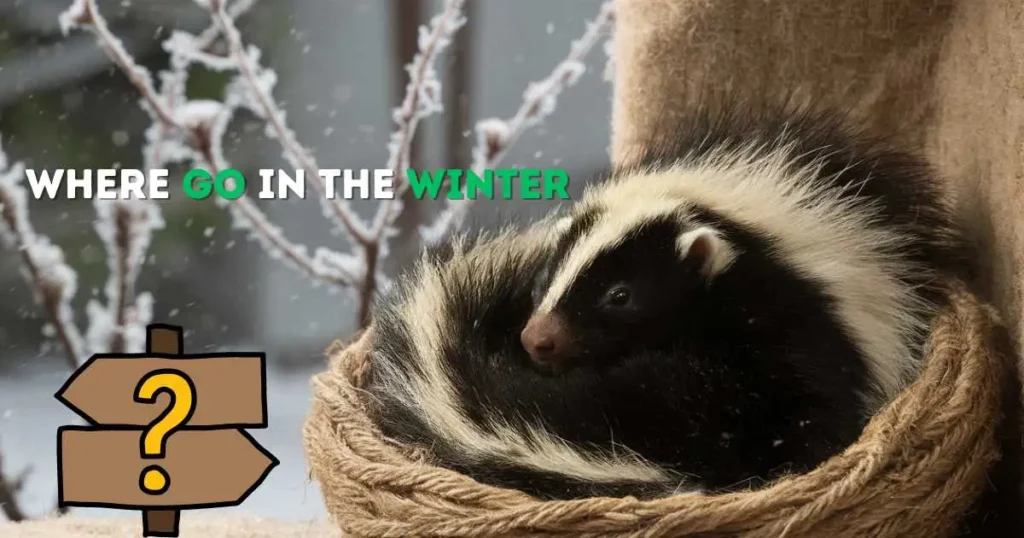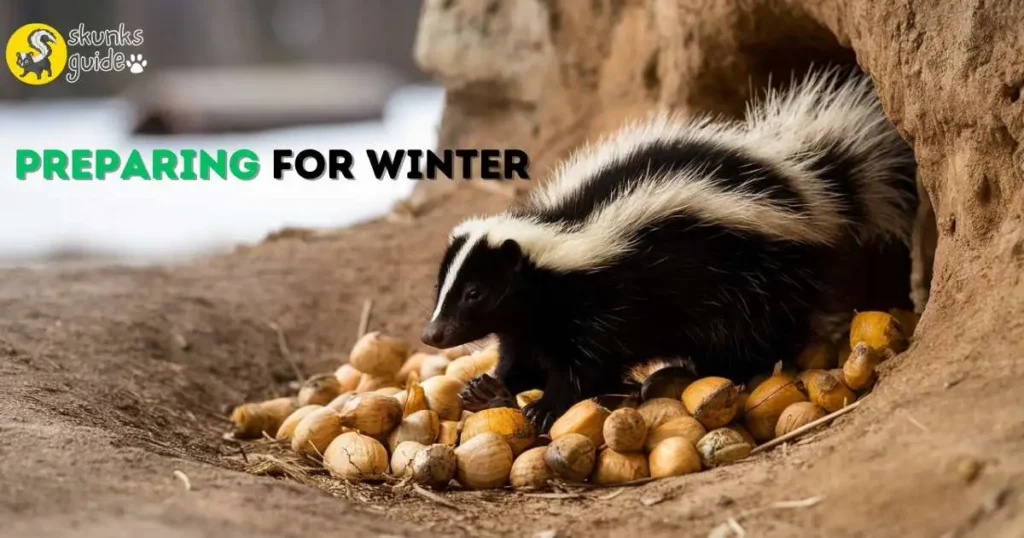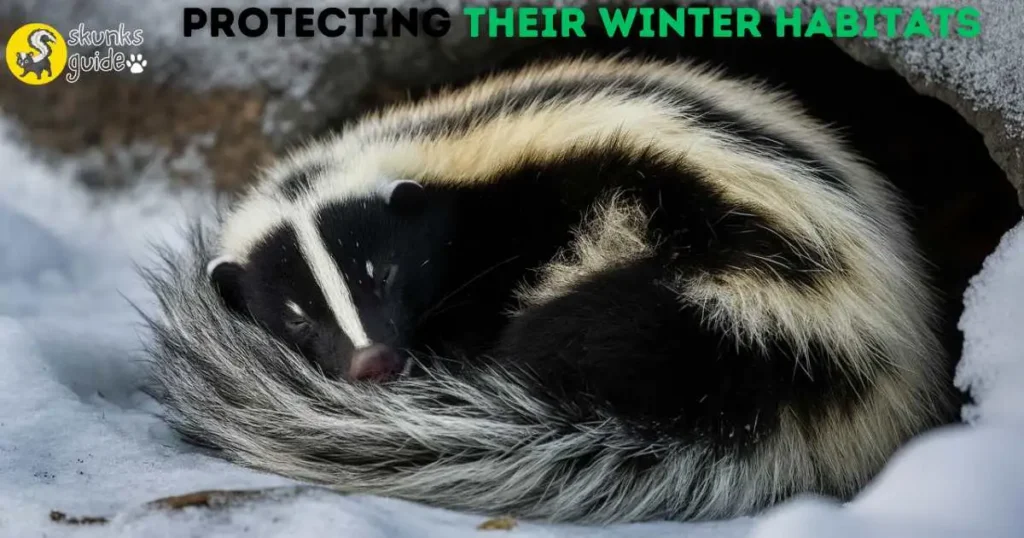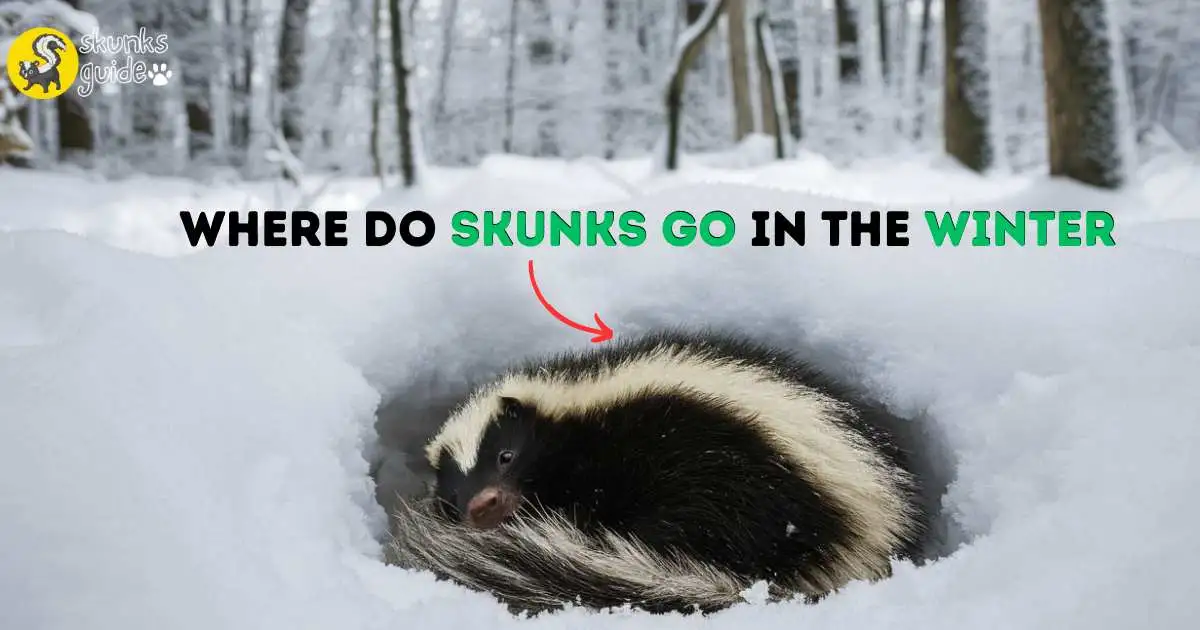Where Do Skunks Go in Winter? How They Survive Cold Months
Last updated on February 28th, 2025 at 11:25 pm
As winter comes, people wonder where skunks go. These creatures are famous for their black-and-white stripes and how they protect themselves. But, their ways of surviving the cold might surprise you. We’ll explore the world of skunks and learn about their winter habits in this article.
Skunk Behavior During Winter Months
When it gets colder and snow falls, skunks change to survive the winter. They have special behaviors and changes in their bodies to face the cold. These changes help them make it through the tough season.
Skunks’ Adaptation to Cold Weather
Skunks have a thick fur coat that keeps them warm. They can also slow down their metabolism to save energy. This is key for them, as it cuts down on how much they need to eat during the cold months.
Skunk Denning and Hibernation Habits
As it gets colder, skunks look for cozy places to stay. They might choose burrows, hollow logs, or old buildings. These spots keep them safe from the cold and let them rest for the winter.
Skunks don’t really hibernate, but they do slow down a lot. They go into a state of torpor during the coldest times. Then, they wake up now and then to find food.
| Skunk Denning Behavior | Skunk Hibernation Behavior |
|---|---|
| Skunks seek out sheltered denning sites to escape the harsh winter weather. | Skunks enter a state of torpor, where their metabolism and activity levels are significantly reduced. |
| They may use abandoned burrows, hollow logs, or even human-made structures as their winter homes. | While skunks do not truly hibernate, their reduced activity and metabolic state help them conserve energy during the coldest months. |
| Skunks often share their dens with other skunks, fostering a sense of community and shared resources. | Skunks will periodically emerge from their dens to forage for food, but they spend the majority of their time in a state of torpor. |
Learning about skunks’ winter habits shows us how amazing and tough these animals are.
Where Do Skunks Go in the Winter

When winter comes with cold and snow, you might ask, “Where do skunks live in the winter?” These animals have amazing ways to stay warm. They find different places to live, from natural spots to buildings, to stay safe and find food.
Skunks often live in their underground dens during winter. They might use burrows made by other animals like rabbits or groundhogs. These dens keep them warm and safe from the cold, helping them save energy and stay cozy.
Skunks also like to live in places made by humans, like woodpiles, sheds, or under buildings. These spots are cozy and safe for them. They can also find food easily, like pet food or scraps in compost piles.
- Skunks often repurpose the burrows of other animals, such as rabbits or groundhogs, to create their winter dens.
- In addition to natural dens, skunks may also take up residence in human-made structures, such as woodpiles, sheds, or even underneath porches or buildings.
- These winter shelters provide insulation, protection from the elements, and potential access to food sources for skunks during the colder months.
Learning about where do skunks live in winter helps us see how amazing these animals are. They can live in many places and survive even in very cold times.
Preparing for Winter: Skunk Denning Sites
As winter comes, skunks look for the right places to stay warm. These skunk winter dens are key for their survival. They help the animals stay safe and warm, saving energy for the cold months. Skunks use many natural spots to make their winter homes.

Natural Dens: Burrows and Hollow Logs
Skunks often pick underground burrows as their homes. These tunnels, made by other animals, keep them safe and warm. They also like skunk winter shelters in hollow logs, wood piles, or old buildings. These spots let them make a cozy den for the winter.
- Skunks change and add to existing burrows to fit their needs.
- Hollow logs and other natural spots give skunks a warm, dry place to stay.
- Skunks might take over old dens or buildings, making them their own for winter.
By choosing and changing these skunk winter dens, skunks make sure they have a safe place to stay warm. This helps them save energy and get through the winter.
Skunk Winter Survival Strategies
When it gets cold and snow covers everything, skunks must find ways to survive. They have clever ways to make it through the winter. These strategies help them stay warm and save their energy.
Torpor and Reduced Activity Levels
Skunks use a special trick called torpor to survive the winter. This means they slow down and use less energy. By doing this, they can lower their body temperature and heart rate. It’s like a deep sleep, but they can wake up quickly if needed.
Skunks also move less during the winter. They stay in their cozy dens most of the time. They only go out when they really have to. This helps them save energy and stay safe from the cold.
| Skunk Winter Survival Tactic | Description |
|---|---|
| Torpor | A temporary state of reduced activity and metabolic rate that allows skunks to conserve energy during the winter months. |
| Reduced Activity Levels | Skunks tend to limit their movement and foraging during the winter, staying within the safety of their dens to conserve resources. |
Thanks to these smart skunk winter survival tactics, skunks can make it through even the toughest winters. Their ability to adapt and save energy shows how strong and amazing these animals are.
Do Skunks Truly Hibernate?
Many people wonder if skunks really hibernate or just go into a state of torpor in winter. Both ways help skunks save energy and get through the cold months. But, they are quite different.
Hibernation is a deep sleep where a skunk’s body temperature, heart rate, and metabolism slow way down. It’s a way for them to save energy. On the other hand, torpor is a short, light sleep where a skunk’s body temperature and activity level drop, but they can wake up anytime.
| Characteristic | Hibernation | Torpor |
|---|---|---|
| Body Temperature | Significant drop | Moderate drop |
| Heart Rate | Drastically reduced | Moderately reduced |
| Metabolic Activity | Greatly decreased | Slightly decreased |
| Arousal Frequency | Infrequent | More frequent |
So, do skunks really hibernate or just go into torpor? Studies show that skunks don’t hibernate like some animals do. They do slow down and get colder, but not as much as true hibernators. They mostly enter a state of torpor in winter.
“Skunks are not true hibernators, but they do enter a state of torpor during the winter months, reducing their activity levels and body temperature to conserve energy.”
This is key to understanding how skunks survive the winter. They can still react to their surroundings and find food, even when it’s cold.
Protecting Skunks and Their Winter Habitats
As winter comes, it’s vital to protect skunk habitats. These animals are tough but need safe places to live and find food. We must keep their dens and places to forage safe.

Groups and communities are working to save skunk homes and food spots. They know what skunks need in winter. This helps skunks survive and thrive.
- Habitat preservation: Saving and fixing skunk dens and hollow logs is key to their winter survival.
- Food source maintenance: Making sure skunks can eat insects, small rodents, and carrion is crucial for them to survive winter.
- Public education: Teaching people why we need to protect skunk habitats and how they can help is important for conservation.
By joining forces, we can protect skunk winter habitats and support conservation efforts for skunks. This way, these special animals can keep doing well for a long time.
“Protecting the winter habitats of skunks is not just about preserving a single species – it’s about maintaining the delicate balance of our ecosystems and ensuring a healthy future for all wildlife.”
Frequently Asked Questions
Do Skunks Come Out In The Winter?
Skunks can be active during winter but tend to be less visible. They may enter a state of torpor, reducing their activity levels. Skunks often seek shelter in burrows or under structures to stay warm. They usually emerge on warmer days to forage for food.
Do Skunks Come Back To The Same Place Every Year?
Skunks often return to the same den or territory each year. They seek familiar and safe environments for breeding and raising young. Factors like food availability and habitat safety influence their return. If conditions remain favorable, skunks will likely revisit previous locations.
What Animals Are Skunks Afraid Of?
Skunks are primarily afraid of larger predators. Common threats include coyotes, foxes, and domestic dogs. They also avoid birds of prey, such as hawks and owls. Loud noises and sudden movements can scare skunks away as well.
Conclusion
Understanding where skunks go in winter provides valuable insights into their behavior. These creatures seek shelter in burrows or under decks, ensuring safety from harsh conditions. By learning about their habits, we can appreciate their role in the ecosystem. Observing skunks can deepen our connection to nature, even in the colder months.

